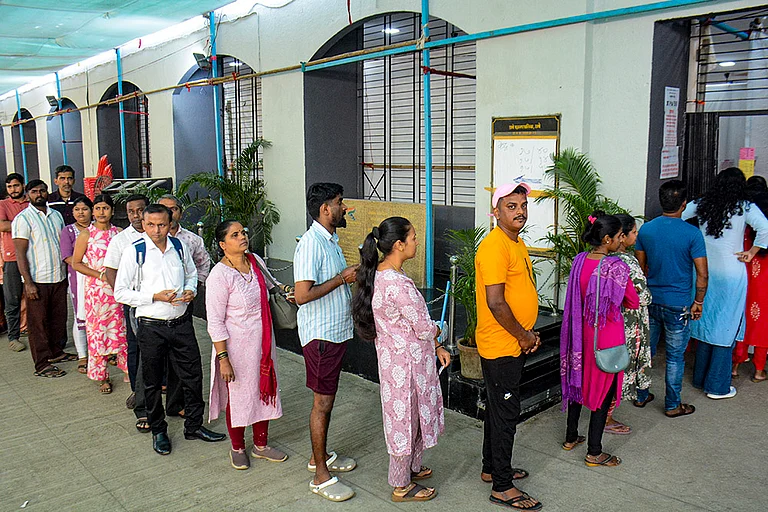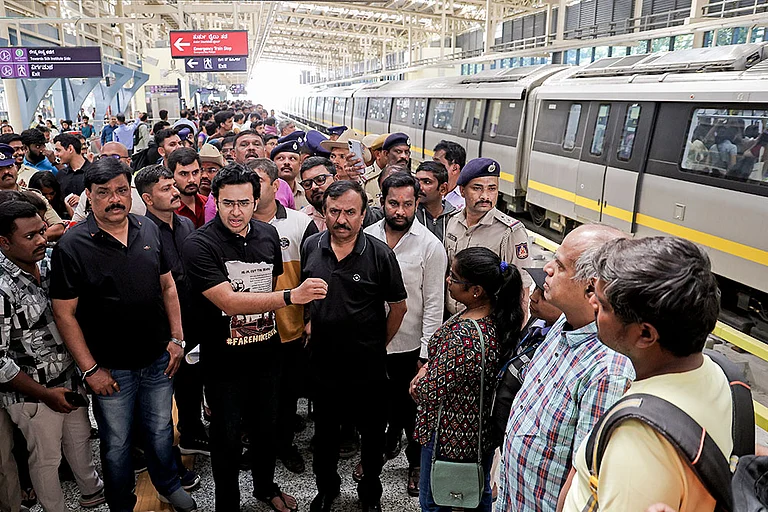Bengaluru, was renamed from Bangalore in 2014. Or as locals call it “Namma Bengaluru”. The capital city of Karnataka which will go to polls on May 10 to decide if the current BJP government will win a second term in the state. The so-called “Silicon Valley of India" generates almost 60% of Karnataka’s revenue and has 28 seats in the 224-member Karnataka assembly.
The same Silicon Valley was inundated under 131.6mm of rain in August-September 2022.
The city’s lakes were full; some breached their banks and the water, finding little space to overflow, then made its way to the city’s streets, in parking lots, and into people’s houses. Residents fled from their homes on tractors and boats. IT employees worked with their laptops on skywalks, trying their best to escape the water but still meet their deadlines at the same time.
Other civic failures were also witnessed by the city. Massive traffic disturbances, power blackouts, reduced efficiency – life that we knew as normal came to a halt. Some areas had to depend on water from bore wells and tankers.
Before this too, the city has made headlines for its civic woes among other issues. But the city’s local civic body, Bruhat Bengaluru Mahanagare Palike (BBMP), has been functioning without an elected council since September 10, 2020, which means that citizens have not had elected representatives at the grassroots level to reach out to regarding day-to-day affairs that directly affect them.
So where do the citizens go if the pothole menace doesn't stop, a drain in a locality is broken, or garbage is overflowing or if there are constant power outages within a ward?
The BJP has been in power in Karnataka since 2019 and has had control over the city corporation. In effect, the city administration is being run by MLAs that are facing strong anti-incumbency sentiment, bureaucrats, and other civic officials.
Alongside the communal politics and caste factor touted as an agenda for the upcoming elections in the state, citizen activists and voters have little options and alternatives when it comes to choosing their representatives. With voting dates right around the corner, the spotlight is back on the city’s crumbling infrastructure and governance alike.
Bengaluru’s electoral performance
A closer look at the city’s electoral performance shows that more than half of the 28 seats (16 of them) have seen the same candidate (on the same party ticket) win the last three elections. Nine of them are from the BJP and seven from the Congress.
BJP MLAs have been elected in the last three general elections in Yelahanka, Malleswaram, Rajaji Nagar, CV Raman Nagar, Basavangudi, Padmanabha Nagar, Mahadevpura, Bommanahalli and Bangalore South constituencies.
Byatarayanapura, Sarvajna Nagar, Shanti Nagar, Shivaji Nagar, Gandhi Nagar, Vijaya Nagar and BTM layout constituencies have remained the strongholds of Congress.
This year too, parties have fielded the same incumbent MLAs in their stronghold regions barring a few fresh faces.
In terms of civic agencies, BBMP is not the only agency responsible for urban governance in Bangalore. There are many parastatals like BDA, BMRDA, BWSSB, BMTC that are responsible for performing the many civic functions of the city.
While a layperson from outside the city would be confused with these acronyms, the urban citizen within the city too is not sure which civic agency is responsible for what. Each agency has a different jurisdiction and is only answerable to the state government and not to the people of the city, activists explained.
The root of the problem is violation of the 74th Amendment of the constitution passed in 1992, which prescribes a Planning Authority - the Metropolitan Planning Committee - that has the role of preparing a draft development plan, and a decentralised, devolved and unified city government, explains Sandeep Anirudhan, Convenor of Citizens' Agenda for Bengaluru.
"The BBMP is none of these. So, the law mandating these two, both the Planning Authority and the city government have been violated by series of governments, leading to the lack of planning and governance in Bengaluru," he says.
The new BBMP Act 2020 was supposed to change the way Bengaluru is governed, says Srinivas Allavalli, another citizen activist. Despite its flaws, it proposed decentralized governance and vested powers in zonal and ward levels which would increase citizen participation.
One of its key aspects was to increase the existing number of wards in Bengaluru to 243. Civic authorities were charged with the task of redrawing wards by subsuming village panchayats, town municipal councils and other local bodies in areas around the city. A process that the government completed in 2022 but has been challenged via multiple petitions in the state high court.
Each constituency was to have a separate consultative committee headed by the respective MLA, which will oversee development works of that constituency and will also include more than five resident association representatives from the area.
“However, we do not know what any of this would look like as the BBMP elections have not been held yet preventing true decentralisation, which is a violation of the Constitution. The Assembly elections will be held before the BBMP elections. We have lost out on years of civic governance,” the activist further says.
So far, the Karnataka government has cited administrative reasons for not holding the elections despite the term of the council ended in September 2020. However, a delayed delimitation process and ‘deliberate stalling’ of elections as MLAs do not want to give up power, are some of the allegations levelled against the BJP-led state government by the opposition, citizens’ groups and even the State Election Commission.
Infrastructure woes
These hurdles to civic governance have also trickled down to the day-to-day affairs of citizens. As Bengaluru witnessed nature’s fury in August last year, fingers were pointed at the city’s unplanned urbanisation and lack of local leaders. With no elected councillors, the regular meetings that the Mayor and the Deputy Mayor used to hold regarding rain preparedness were also not done last year.
"Over the years, we have destroyed lakes and started construction in wetlands and floodplains. Of course there would be flooding when it rains because where will the water go? We have destroyed around 95 percent of wetlands. There are so many houses, offices and roads sitting in the path of the water, which causes floods," Sandeep says.
Once known as the Garden City, Bengaluru has also lost about 97% of its forest cover, he explains. Flood plains, marshlands and buffer zones are protected under wetland rules, NGT rules and Karnataka Tank Conservation and Development Authority rules but all these rules have not been enforced by the MLAs, Sandeep says.
The Kempegowda Bus station, also known as the majestic bus stop and Kanteerava football stadium, Karnataka Golf Association Golf Course, on Old Airport Road – popular landmarks of Bengaluru – were built on lakes. Activists point towards rampant corruption in the civic body that led to such massive encroachment on lakes, rajakaluves (storm-water drains) and the buffer zone, inviting a disaster. “Both private parties and government are equally guilty of encroaching on these lands,” Sandeep says.
The root of the problem is violation of the 74th Amendment of the constitution passed in 1992, which prescribes a Planning Authority - the Metropolitan Planning Committee, which has the role of Masterplanning, and a decentralised, devolved and unified city government. "The BBMP is none of these. So, the law mandating these two, both the Planning Authority and the City Government have been violated by series of Governments, leading to the lack of planning and governance in Bengaluru,"
The blame game was also visible in the political circles when state Congress president D.K. Shivakumar asked what stopped the ruling BJP from clearing these encroachments. Then, former chief minister and Janata Dal (Secular) leader H.D. Kumaraswamy asked Chief Minister Basavaraj Bommai to release a white paper on the encroachments and name those guilty. Bommai asserted that only a part of the city was flooded and blamed the previous government. “The previous Congress government... gave permission for construction even in the lake bed, tank bunds and buffer zone. I have... given Rs1,500 crore to develop storm water drains and Rs300 crore to remove encroachments,” he said according to media reports.
Along with flooding, reports state that there have been 269 ‘officially’ reported pothole deaths between 2014 and 2021 in Karnataka and most of them were in Bengaluru. A Comptroller and Auditor General of India report for 2020-21 found that BBMP roads in Bengaluru—witnessed an average of 19-20 mishaps per km—far more dangerous for motorists than state highways (8.87 accidents per km) and national highways (7.39 accidents per km) in Karnataka.
To that effect, a two-judge Supreme Court bench of Justices B.R. Gavai and B.V. Nagarathna warned authorities in Chandigarh in January this year, to remain cautious with its expansion plans and see the ‘condition of Bengaluru’, using it as a perfect example of urban ruin.
The most recurring voter priorities in Bengaluru have remained drinking water, better roads and employment opportunities across all four Lok Sabha constituencies in the city, as per an All India Survey on Governance Issues and Voting Behaviour 2018 study by Association of Democratic Reforms (ADR). Although political parties have time and again promised restructuring of civic agencies and creation of Metropolitan Planning Committee (MPC), they have not taken shape on the ground yet. Whether these priorities shape people’s votes in this election is what remains to be seen.






















